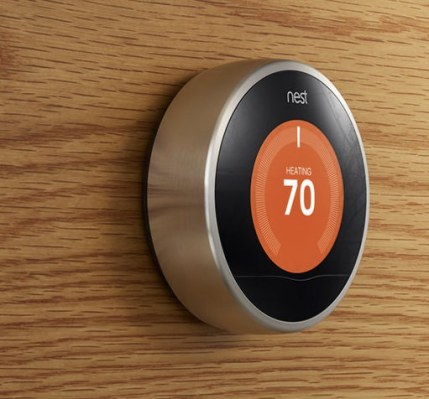When Google acquired smart thermostat maker Nest for $3.2 billion, the startup quickly stated that it would never share its user data with other Google services and outside companies. But according to a recent report by Forbes, the company is taking advantage of its data to create a lucrative revenue stream from electric utilities.
“Our privacy policy clearly limits the use of customer information to providing and improving Nest’s products and services. We’ve always taken privacy seriously and this will not change,” Nest wrote in the Q&A post following the acquisition.
Similarly, Nest co-founder Matt Rogers declared to Forbes that it doesn’t share actual data with the utility. But it doesn’t mean that the company shouldn’t take advantage of its customer information without sharing hard numbers.
The company has negotiated deals with multiple energy partners in the U.S. Some utility partners are willing to spend $30 to $50 per year and per thermostat to be able to turn the air conditioner up when it’s a hot day. This way, the utility can levels load on the grid. Partners don’t have direct access to the thermostats, they just sign a deal with Nest, and then Nest has access to the thermostats.
More importantly, in other cases, Nest splits cost savings with the utility. As a reminder, Nest’s main product is a smarter thermostat that should allow you to cut your energy bill. It seems counterintuitive as utilities have foster energy wasting.
But these providers have to spend a lot of money to fight congestion when they bring more expensive power plants online. Nest reduces these infrastructure costs. It’s unclear whether the startup is the one who shares an estimate of how much the utility saved or if the utility figures this number out by itself.
According to Forbes, revenue from utilities will outweigh direct revenue from thermostat sales — we’re talking about tens of millions or even hundreds of millions of dollars per year. The company’s execution is very smart as electric utilities seem to have very limited, or even no access to actual data. Nest refuses to work with utilities who don’t agree with that.
Moreover, it’s a recurring revenue stream. Even though you don’t buy a thermostat every year, Nest will generate revenue from utilities — or, at least, that’s how it’s supposed to happen if Google lets Nest follow this strategy.
Update: Here’s a relevant abstract of Nest’s privacy policy.
We may share your aggregated and anonymous information in a variety of ways, including to publish trends about energy use and conservation, to help utilities provide demand-response services and to generally improve our system. We’ve taken steps to ensure that the information cannot be linked back to you and we require our partners to keep all information in its anonymous form.
